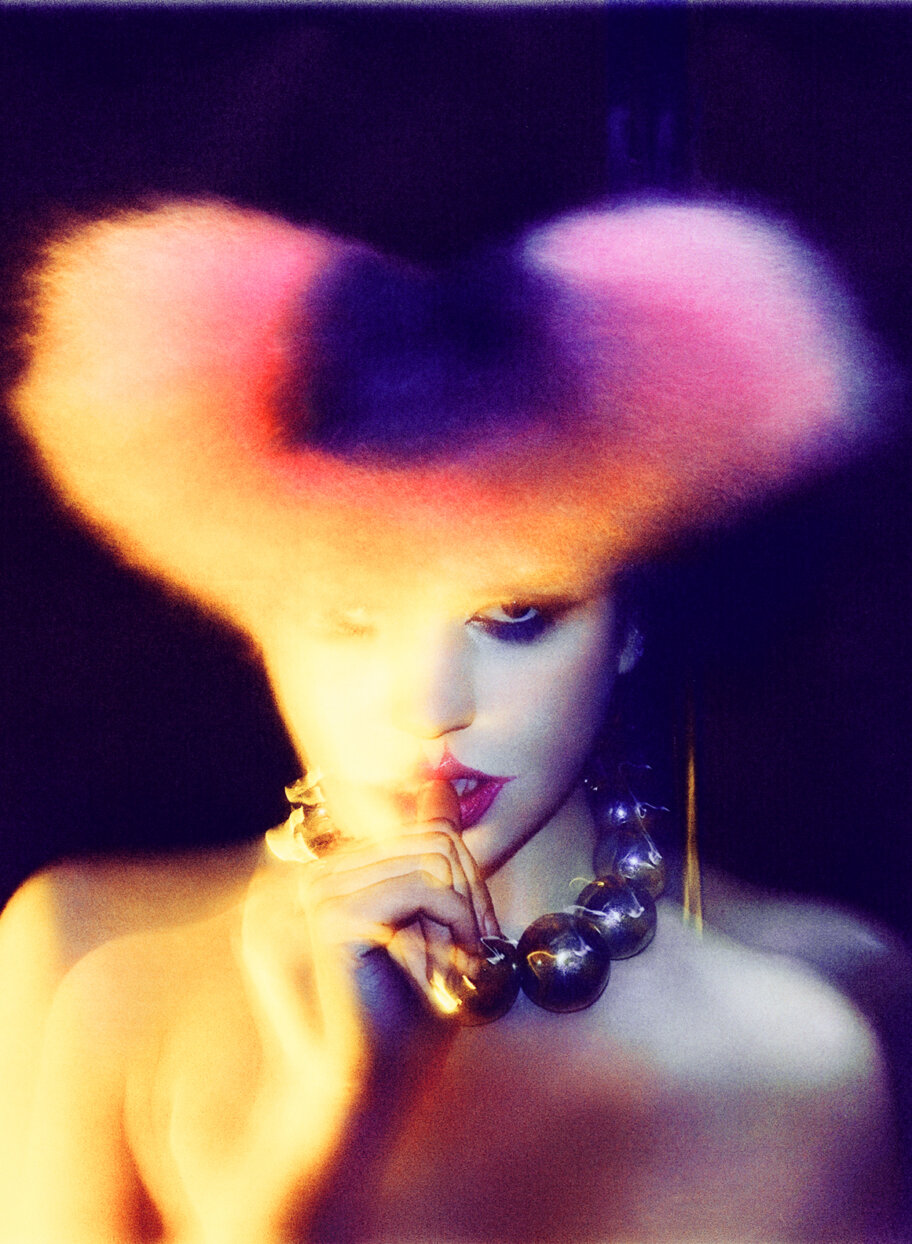
PHOTOGRAPHY JASON THOMAS GEERING @jasonthomasgeering
STYLING JESPER GUDBERGSEN @yessirjesper using only archive, personal pieces and sustainable designers
HAIR ADAM MARKARIAN @adammarkarian
MAKEUP MIGUEL RAMOS @mmiiggss
PHOTOGRAPHY ASSISTANT TAIYE GODBODY @taiyegodbody
SPECIAL THANKS ALBRIGHT FASHION LIBRARY @albrightfashionlibrary and ELSKER STUDIO @elskerstudio
Hi Julia! How do you present yourself to the world and what do you tell people when you first meet them?
My name is Julia Cumming and I’m an artist, first and foremost. I’m a singer and model, and I have some history of activism, although I think that can be a hefty word. To me that means that I am passionate about people being involved, inspired and empowered to engage with their surroundings, in whatever way is natural to them, and fighting for their ability to do all this. I’m from New York City – born and raised – and I still live here
What was it like growing up in New York and why are you still here?
I grew up in the apartment I currently live in. My parents moved here in 1989, and while they don’t live here anymore, it was very important to the three of us that there was always a family flag planted here in the city. A way for us to have an affordable way of being here. I grew up on Avenue B and I’ve watched the neighborhood change so much, but at the same time there is so much DNA in this area that can’t really be bought and can’t be taken away. I think when you grow up in New York there are certain privileges of exposure to the world and since I was someone who had a lot of dreams very early, I had many opportunities to engage with them in different ways. It gave me a head start in my life and it gave me a perspective that I feel I was lucky to have. I’m really grateful that my parents chose to raise me here and I am grateful to the city for giving me so much access to art and music, and allowing me in with no judgment.
Have you ever lived anywhere else?
A big part of my life has been spent on tour. For many years I was on the road 100-150 nights a year, so I didn’t really live anywhere. It’s only since the pandemic that I feel like a New Yorker again, and it’s a good feeling.
You can almost hear music playing as you walk down the pavement in the East Village, it’s part of its soul. It’s been an obvious influence in the way you present yourself to the world and in your music. Tell me about your neighborhood?
My parents met in a band and are both very musically oriented. While they didn’t end up choosing music as their careers, they stayed very connected to the scene here. One thing my dad would do in order to keep his connection to music close was to offer to play bass for songwriters that he liked in the East Village and Lower East Side. The anti-folk scene that was all around us was sort of a place for rejects and somewhere you were allowed to do anything musically and beyond. Through him, I was exposed to a lot of people who were living their lives as artists in New York without asking for anything more. They were not rich, they were not people who were supposed to be there, they were living their lives as artists on their own terms and nothing else mattered besides them having the capability to do it and having a place to live and be a part of the community. I feel that this spirit really made its way into my life and has also been a part of why I’ve been able to survive in this field. There’s never been a part of me that wanted anything more than just the chance to do it. Do you know what I mean? I never thought I was gonna make a lot of money from it. I always hoped that I would be successful enough to keep doing it, but the driving force was that I saw all these weird people, I wanted to be like them and I saw that there was a different way of living life, and a different way of being a part of the world That spirit and energy was really influential on me. Not all of it was great for a child, it was unhinged, but I think the benefits greatly outweigh what was potentially challenging about it. I’m really grateful that I was exposed to these people.
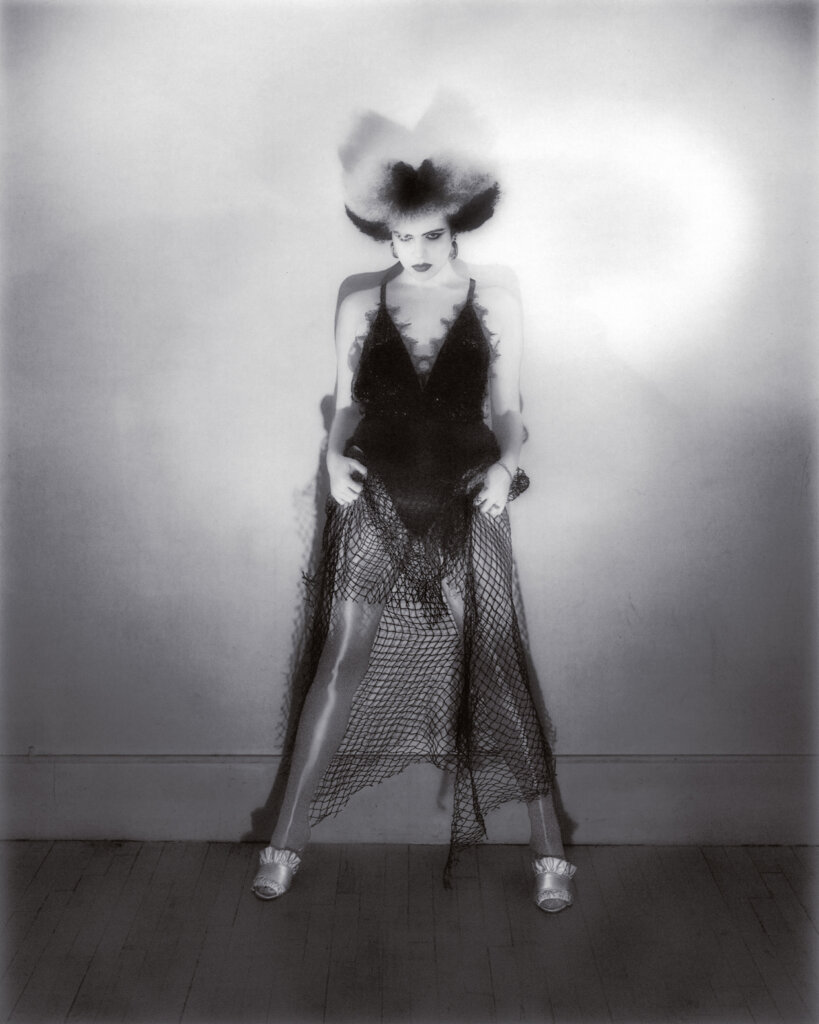
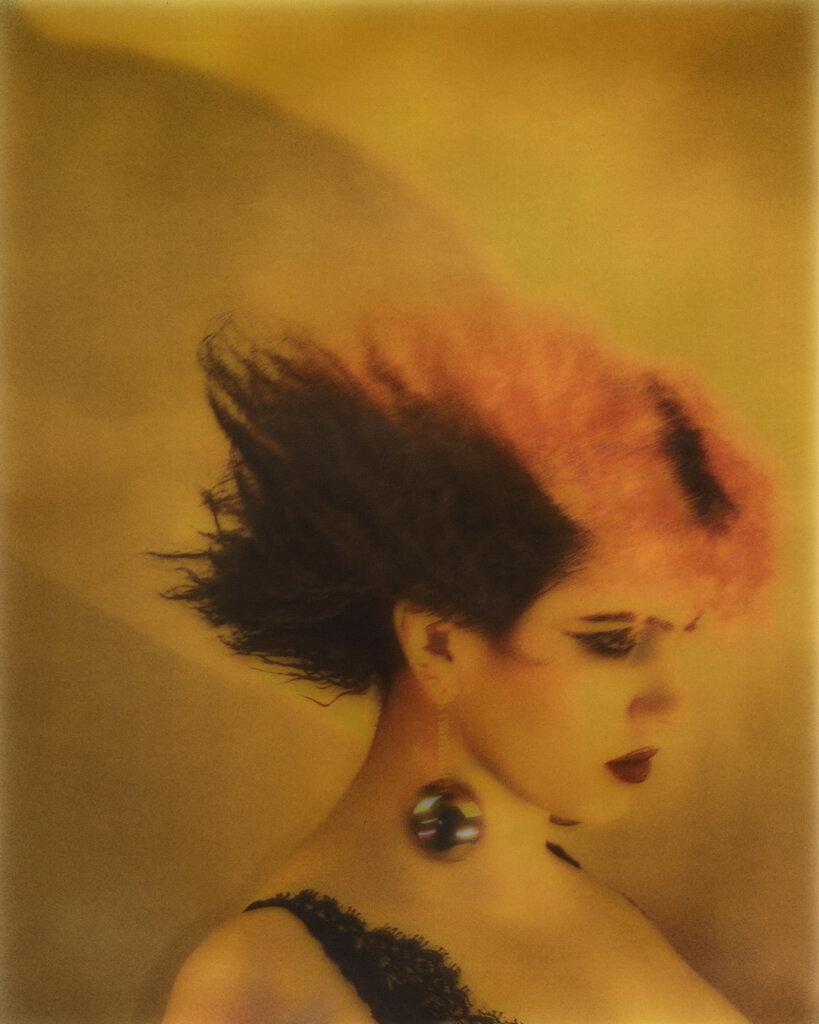
How do you think the spirit of New York has changed since you were a kid, or even since your parents’ generation went through that?
I think it’s important to touch on that. Everyone who lives here can see our favorite landmarks become drugstores and it’s sometimes like walking through a graveyard. Someone said the other night how New York really is the closest you can get to feeling like you’re in Europe in the United States. It’s the closest to that artistic headspace and I think no matter what is happening geographically or economically, New York always attracts a certain kind of artistic spirit, I think that’s a part of the city’s DNA; it inspires people and I think no matter what cycle it’s going through, that stays intact. Before the pandemic I would say to myself that the New York art scene is not going to improve unless there’s a recession, and when the pandemic hit it truly and honestly did bring a different generation and community of artists into the music scene. We can intellectualize it or we can just enjoy the work they’re doing – I for one am happy for every person that’s here. If anyone can do it, God bless and I’m coming to your show. Thank you for engaging in the scene and trying to help the city become more than one giant Chase Bank.
Is there a song that reminds you of your childhood?
I would say Waltz #2(XO) by Elliott Smith. I remember dancing around this exact living room I’m in now, with my feet on my dad’s feet. He’s 6 ‘5 – imagine how fun that was for me at three years old. It must have been like an amusement park ride.
Tell me what you were like as a teenager.
Reckless, depending on who you ask. I was extremely passionate and I think about that time a lot now. How the fuck did I have the energy to do that? When you’re a teenager, your body is just insane: you need no sleep, you’re everywhere all the time and you’re so cute.
Did you have time for school?
Just before high school I met my friend Rachel who was in a band and I quickly joined forces with them. Before that I had not done anything in music, no singing, songwriting or even an instrument. I went on several tours with them – in 8th grade – and when I came back at the very last minute I auditioned for a professional performing arts high school. I feel like I just barely made it, I was so fortunate. That school gave me a really unique opportunity to put my career first because the teachers would have to come up with work around missing school. I started working really hard at that time playing lots of shows, touring all the time, while doing school at the same time.
How did you find out that modeling was a thing you could do as well?
Rachel would do some modeling stuff. I think that’s where I saw there was potentially a way to have a life in the arts. We did photoshoots with the band and I noticed how the two could integrate and give you freedom. It was not your typical ‘beautiful girl walks down the street and gets scouted by an agent’ moment, it was more of an “oh shit, if I can make this work, I get the chance to be a musician.” So I got to work. I was really tall, so I had that going for me and in some weak psychological moment, I dyed my hair blonde. So it was the culmination of things: I ended up joining Sunflower Bean in 2014 while I was still in high school. I was working on a performance art piece I wrote music for, I was interning at the MoMa, played three shows a day, rehearsals, school… And then all of a sudden I got an email from YSL: “We see you and we want to meet you” and it very quickly led me to basically becoming Hedi Slimane’s muse, doing fittings, walking shows and being the star of multiple campaigns.
And I was like, yeah, I’m not going to college…. I was in Paris, about to turn 18 and I realized how I had to grab it, or it would slip away. I had to do this. I went straight into building my business with my bandmates and manager and that’s what led me here
What do you think are some of the highs and lows of your modeling experience?
My experience at YSL was definitely a high. But they always say – you haven’t walked the show until you’ve walked the show… You can always get canned. I really always thought someone was gonna pull the rug out from under me, that it was all just a big joke. I don’t feel that this was a place I was destined to be – it’s a place that I fought to be. I’m grateful to fashion for so many things, but I think having access to the greats, like working with Steven Meisel and Pat McGrath as an example, was a huge special thing for me. Being exposed to how they think, the way they care, their touch, their spirit – their work ethic and their vision. Living legends. As far as we know you can’t choose your face. You can’t choose who you’re born to. It’s something you just get and for me, it created this situation in which I get to be with these masters of their craft. I think something that will always stay with me as I move through life as an artist is having witnessed what happens when someone can take themselves that seriously and commit to their vision in such a way. As for the lows, I think there’s a lot of fairly predictable lows within modeling. But I see that there’s a lot of work that’s been done and I think the Model Alliance is a big part of the change to where models now feel more safe. I’ve been lucky because my fashion career has always related to my music career and in a way, that has protected me from some of the unfortunate things other girls go through. To me it always felt like there was a clear difference between the two worlds I moved in. I think fashion can have so much depth, but it is a lot about surface: You go to a casting and your body or face isn’t doing what they need – I can’t feel bad about that. But when my music gets torn apart or someone butchers it, it feels like your entire spirit is being put through the cheese grater. My challenges within fashion have been easier for me to understand and also helpful for me in growing a thick skin. It’s given me a healthy perspective, knowing that it doesn’t really matter what people think as long as I keep showing up. They can like me or not like me but it doesn’t have anything to do with my value as a person.
Do you think you understood that even when you were 18?
I don’t think I understood it in that way. I had dreams of being this kind of high fashion chameleon who was also an amazing rock star. It took some understanding and experience to realize that the chameleon could get in the way of people’s ability to understand me as an individual. It’s really the most important thing and is still a challenge that I think any artist has to work with. My dreams within it changed,
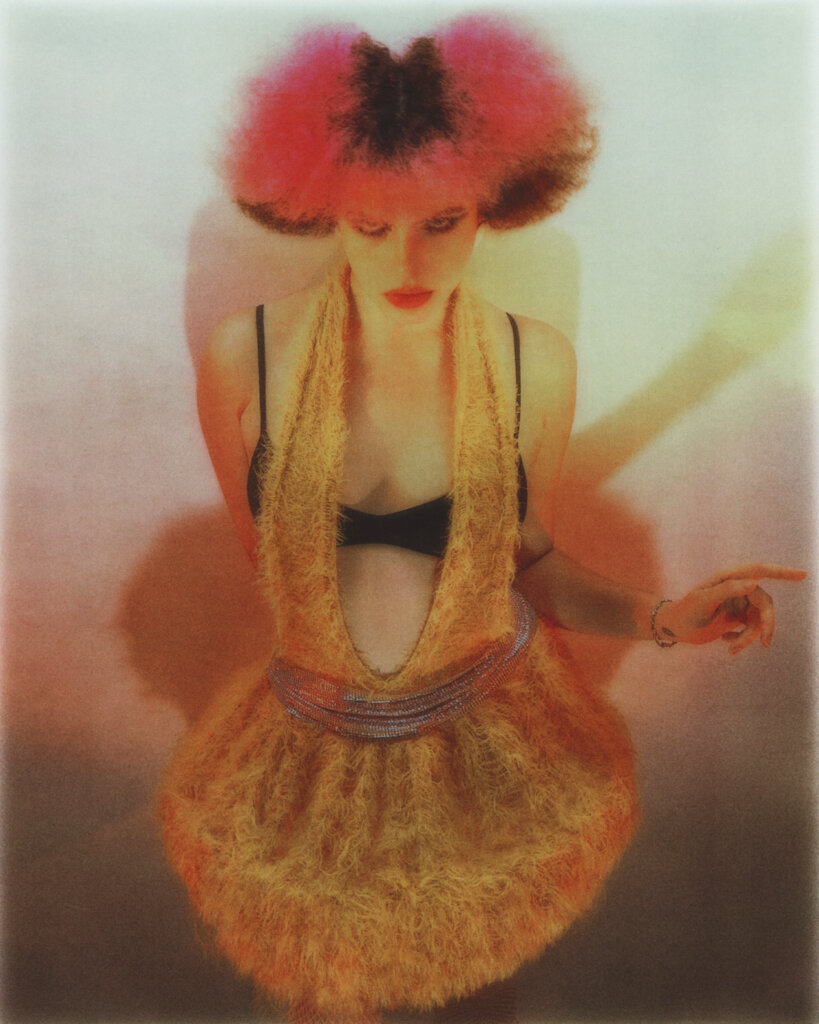
How do you think being in the fashion world shaped your image of beauty and yourself?
It’s funny because this question also relates to my experience being in New York. One thing I’ve always loved about New York is how anonymous it feels as you walk through it.
I have one outfit when I go outside to get coffee with my dog where I’m completely invisible, but when I’m in the mood, I think more about how I present myself with my clothes and makeup. Your look is a way to define yourself to yourself, but it’s also a way for you to present an image and statement to the world – and for the world to give you feedback, whatever that may be. But I always think of New York and its anonymous spirit as a really great conversationalist, where – depending on the reactions that you get or don’t get – it becomes a dialogue that I really love. I guess beauty for me is a tool. It’s an artistic tool, a way to try to relate to others and it’s your way of representing yourself without having to speak. You’re being interpreted, so it’s a powerful communication tool for yourself and others. It’s as deep as you want it to be and it changes whenever you want and that’s the beautiful thing. There’s not many things we can change about ourselves so quickly.
Where do you find moments of beauty in your life?
The most beautiful moments in my life are when I’m walking around Avenue B with my person and my senior dog who is 16 years old and the sweetest thing I’ve ever seen. She’s kind of gnarly, kind of ugly – but she’s so beautiful. I think that’s what interests me in art lately, that pure spirit, a love that is so inside that it cannot be sliced in any type of way. It’s so gooey that it scares you and if you hit it wrong, it could be so cheesy, but when you hit it, right, it’s just undeniable, I think that that’s what beauty means to me right now: people being themselves so thoroughly that it cannot be denied. To me that is the most beautiful thing you could do and that’s what I would aim to be.
Switching back to music: When you’re done with work, recording, practicing, performing – whatever your day looks like – does music continue ? Do you listen to music at home?
I listen to a lot of Hiroshi Yoshimura, ambient music or music without lyrics. Lyrics can be very triggering. Being able to have the opportunity to engage in something you love as much as I love music is a privilege at any level. But it also makes it harder to have an experience as a listener. Lately, when I listen to something it’s because there’s something about it that I want to emulate, learn from, or sometimes I want to reverse engineer it and I want to figure out how it works and why. I do a lot of my own version of song mapping where I listen, I write down how long certain parts happen for, what happens, why – it’s my own assessment of what makes it work. So you see, in me doing that, it’s probably hard for me to relax too much with music around…
Is there a particular musical moment that stands out to you, as early inspiration, or even an a-ha moment?
When I was very little I would watch a VHS tape called Glam Rock. It’s a collection of performances from Sweet, Slade and the like and I would watch it over and over until the tape finally broke. I mentioned it once somewhere and fans have brought me several copies of it – they’re on display at my house. I was extremely inspired by glam rock and the fact that a lot of times, it’s these weird British guys with their teeth kind of fucked up, the hair is terrible, they’re in tiny ridiculous outfits and you can almost smell the BO. I became sort of inherently intrigued with what makes a performance unforgettable – outside of the physical being. Their looks are the least important thing about it – what I’m seeing is actual magnetism in a human body. I’m watching this interaction between the performer and the crowd and I feel like a part of it – I’m seeing and I’m feeling the power of performance. I obviously did not have the words for it then but as I have dissected why this was such a powerful experience for me, I learned that glam rock really showed me this thing of – you don’t have to be perfect, you don’t have to be young – you don’t have to be anything. You have to be yourself in a shiny fucking outfit and you can’t leave anything on the table. If you give it all, people will come with you.
I am also very influenced by New Wave and Devo is one of my favorite bands. I think Devo is probably the best example that we have on earth of a band being able to use pop music to influence a culture in a truly subversive way. That was a thing that made me fall in love with the ideas of bands as a concept and fantasy. If you can get a group of people together and tell a story through clothes, ethos and sound, you can actually change the world and access people through this medium and your commitment. Luckily my first band Supercute! was all about commitment. We were truly an art rock band, and only wrote about food, animals, things that were genuinely happening to us. We refused to write about boys – that was part of our ethos. We sewed our own clothes, made giant hair bows out of trash and that band taught me everything about committing to the idea. If you can just commit, you can learn all the other stuff. The hardest part is to suspend reality and to make yourself rid of the judgment that every single other person is gonna put on you. If you can just put your middle fingers up and say “I don’t care”, this is my idea!, then you’ve pretty much done it. I feel that being able to learn that so early really helped me, I’m glad that I didn’t have to learn that in a different way. It took me a much longer time to learn how to actually be a good musician – that was way harder.
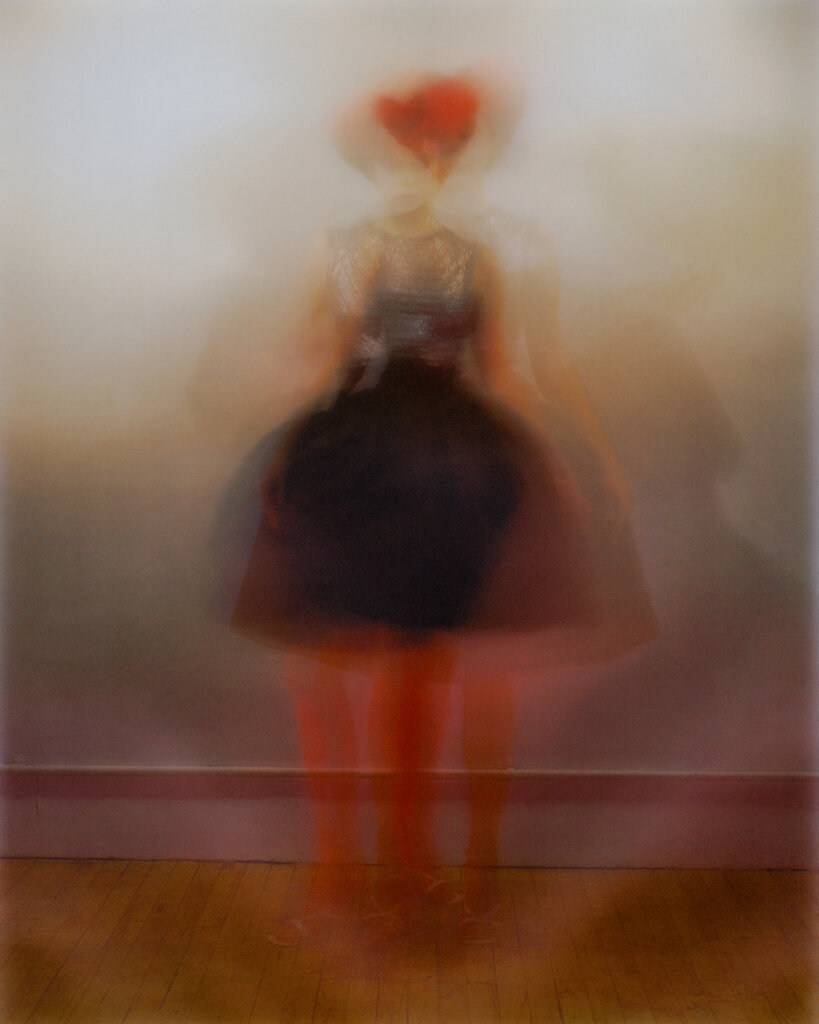
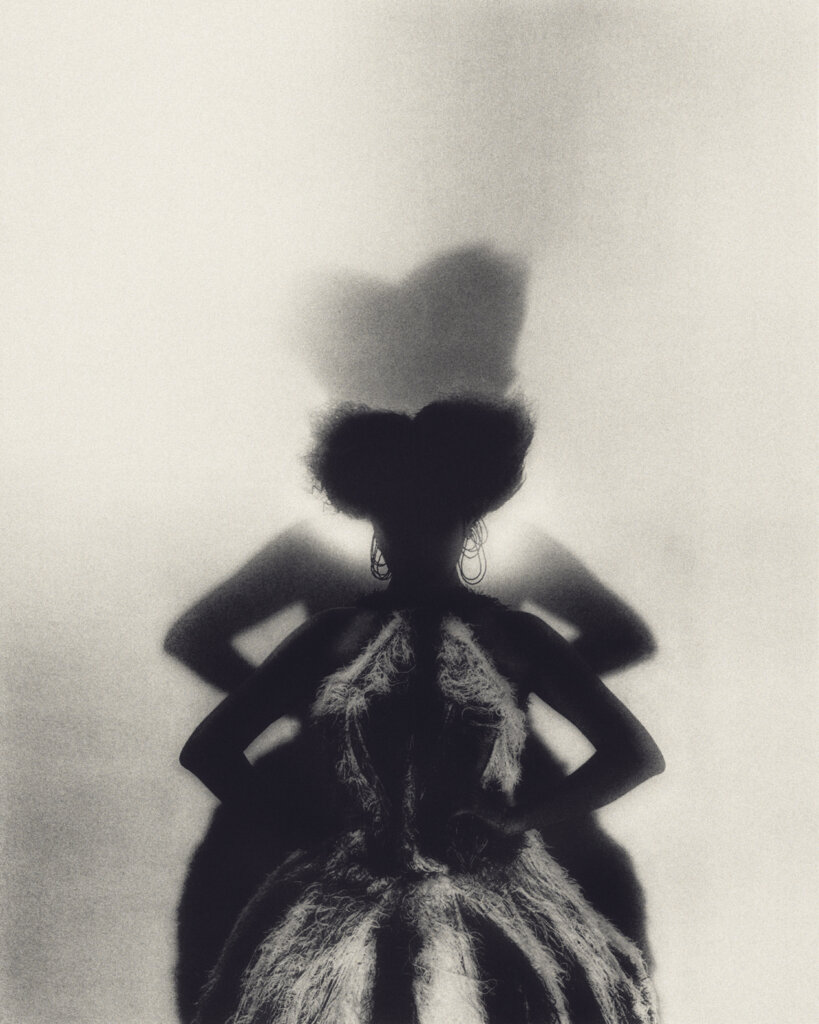
You made me think of performance and the thrill of interacting live with an audience. Can you talk a little bit about what that gives you?
It really depends. I mean I still definitely get nervous depending on the setting but it’s kind of a little more like an excited ball. Sometimes you feel a little little sick or the energy is somehow off before a show. But I’ll play the show and then I’ll be good afterwards. I think the longer that you’re a musician, the more you end up relying on that particular energy cycle to give you relief. I guess there’s a certain release, a relief of tension that comes from playing the show, or attention that comes from writing a song and there’s something very satisfying about the energy loop that you create performing and receiving from the crowd.
You call it both relief and release. Some call it a high. Does it become addictive, and drive you crazy when you cannot get that ?
I think so. I think the pandemic was a great example, where I think a lot of us felt that we lost that muscle a little bit. And it took a bit to get it back. I would also say that I’ve performed enough now at this point in my life that if I don’t get that for a little bit it’s okay – and I will say: I really love my antidepressant and it keeps me from losing the plot. There are certain eras in my life where not performing would have been absolutely crushing, but I feel more stable now and that I can accept what comes. Performing is hugely important to me and it’s definitely something I want to do as long as that is the story I trust is the one I’m supposed to be telling. My life is about art and music and that’s my story.
It also allows a space where you can step outside of your head right? You interpret and dissect music all day long, but you also feel this urge to just share it..
Making it is only half the part. It has to be heard for the loop to finish.
That brings us to the process of songwriting. What does that look like for you?
You have to keep your ears open to what life is telling you. That’s definitely not my idea, other people speak about this often. Being an artist is knowing when to hit record on your ear and say ‘this is the moment I’m supposed to be capturing’. Which it’s almost a little bit of the antithesis of how we’re taught to be living life. We’re taught to wake up, eat your breakfast and get in the car to work, do your work, drive home, watch TV with your spouse, brush your teeth. Go to bed. We’re not taught to engage in an introspective experience, because that’s very painful and that’s very scary. I think when you’re writing songs, you’re working a lot with your subconscious which requires keeping your it accessible – and that is also very very painful. I definitely go through this kind of push and pull of trying to keep yourself together, but also trying to listen to the parts of yourself that are potentially unsavory or scary because that is the essence of what really needs to be said. The thing you’re afraid of, the thing that you’re upset about, the thing that the rest of the world wishes that you could just push down, is also pretty much as close as you can get to yourself. That is the thing that people really want to hear and that’s what people really need art and music for, to put words to their human experience that they are not allowed to say. I believe it is your duty as an artist to go to these places in order to really have the right to be there. And in order to feel right about taking up that space, you need to go all the way. We need to scare ourselves a little bit.
It’s a wild ask of yourself. You don’t get to clock out, you are choosing to constantly leave the door open and look inside to access these things…
On the surface, there are a lot of things in this world of art that are fun. We look cool, we’re going to a party…I’m playing a show and I can drink on stage and, wow, my life is so alternative and that is fun. But it has helped me a lot to realize that you have to separate them – the life you can live within it can be fun and alternative, but separate that from the fact that being an artist is not fun. You don’t do it because it’s fun, you do it because you’re probably a little bit mentally ill and there’s something about you that has to do it and you’re willing to keep doing it. I remind myself that I am not the only fucking person doing something hard, like, grow a pair Julia, get up and do something. Anybody that does what they want to do in life is doing it with a certain sacrifice. It can be a little painful and that’s okay.
How do you know when a song is done? Is it ever done?
That’s a very good question. I would say it gets easier to know, the more you work that muscle and the more in tune you are with yourself and what that means to you. How broadly you’re willing to approach that question. Everything in music is really about feel, and what’s really important is how whole the essence of what you’re putting forth is. For me it’s a very spiritual thing, rather than a literal thing. When you start to play with it, if you add a lyric here, add something there – if you get to that point where everything you’re adding is just a bit too much, you are done. When you feel like the essence and the idea is whole, hearable, perceptible, touching and the song gives you an emotion, you are done. You’re almost running towards a cliff and trying to find where the end of that cliff is. That involves your trust in yourself; that you’ll know if you’re about to fall over the cliff.
Do you like doing covers?
I do like doing covers. One of Sunflower Bean’s most streamed songs is a Neil Young cover of ‘Harvest Moon’
What are some of your favorite covers?
Obviously, “It’s My Life”, No Doubt. And Sonic Youth covering the Carpenters’ “Superstar” A great cover is so deep because not only are you playing with melodies that people already have a relationship to, but you can also use the cultural context and the familiarity of those melodies and there’s an inherent depth. I think that’s why interpolation is such a big part of pop music right now, because much of it is already decided and that familiarity and recognition is so priceless.
What’s next for you and the band in the new year?
Sunflower Bean has just resigned to one of my absolute favorite record labels in the world, Lucky Number, out of London. They are great people with great taste and also great hearts, which can be a real challenge to find in the music industry. I feel so happy about embarking on Sunflower Bean’s next ventures with them. And there will definitely be some music coming out in 2024, and performance. I’m performing at Carnegie Hall on March 20th, a celebration of Sinéad O’Connor and Shane MacGowan which I am really excited about. I feel that 2023 was about rebuilding, and building in general, so I’m very excited for 2024 to be more front-facing and more engaging with the world.
| Cookie | Duration | Description |
|---|---|---|
| cookielawinfo-checkbox-analytics | 11 months | This cookie is set by GDPR Cookie Consent plugin. The cookie is used to store the user consent for the cookies in the category "Analytics". |
| cookielawinfo-checkbox-functional | 11 months | The cookie is set by GDPR cookie consent to record the user consent for the cookies in the category "Functional". |
| cookielawinfo-checkbox-necessary | 11 months | This cookie is set by GDPR Cookie Consent plugin. The cookies is used to store the user consent for the cookies in the category "Necessary". |
| cookielawinfo-checkbox-others | 11 months | This cookie is set by GDPR Cookie Consent plugin. The cookie is used to store the user consent for the cookies in the category "Other. |
| cookielawinfo-checkbox-performance | 11 months | This cookie is set by GDPR Cookie Consent plugin. The cookie is used to store the user consent for the cookies in the category "Performance". |
| viewed_cookie_policy | 11 months | The cookie is set by the GDPR Cookie Consent plugin and is used to store whether or not user has consented to the use of cookies. It does not store any personal data. |